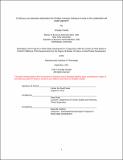Is Morocco an attractive destination for foreign investors looking to invest in the residential real estate segment?
Author(s)
Oubala, Khadija
DownloadFull printable version (1.438Mb)
Other Contributors
Massachusetts Institute of Technology. Center for Real Estate. Program in Real Estate Development.
Advisor
Peter Roth.
Terms of use
Metadata
Show full item recordAbstract
Over the last decade, Morocco has witnessed an accelerated process of political, economic and social reforms aimed at improving the business climate and solidifying the economic indicators. Morocco's structural reforms share the objective of positioning the country as an attractive investment destination. The impact of these reforms has been felt in many sectors particularly real estate which has been developing at phenomenal rates in recent years. Aware of the great strides that Morocco has taken to position the country as an attractive investment destination, many foreign real estate developers expressed their interest to participate in the real estate sector. However, the financial crisis forced these developers to revise their business plans and put their projects on hold. Structured into three sections, the thesis aims to answer the question of: Is Morocco an attractive destination for foreign investors looking to invest in the residential real estate segment? The first chapter introduces the country and highlights key social and economic reforms which establish Morocco as a growing emerging economy whose government is proactively introducing investor-friendly reforms, incentives and programs. The second chapter presents an analysis of the housing sector, its demand drivers and supply indicators. A market segmentation is then performed which coupled with a market analysis, case studies and interviews, reveals that the low income segment is the best segment to target for investment. The third chapter sheds light on the evolution of foreign direct investments in the real estate sector. It proceeds to identify the differences between the local and foreign developers in terms of focus, strategy and profitability as well as outline key measures that the Moroccan government should take in order to encourage foreign participation in the sector. The paper concludes with a summary of findings and an investment framework for future developers looking to participate in what seems to be a lucrative and rewarding sector.
Description
Thesis (S.M. in Real Estate Development)--Massachusetts Institute of Technology, Program in Real Estate Development in Conjunction with the Center for Real Estate, 2011. This electronic version was submitted by the student author. The certified thesis is available in the Institute Archives and Special Collections. Cataloged from student-submitted PDF version of thesis. Includes bibliographical references (p. 53-54).
Date issued
2011Department
Massachusetts Institute of Technology. Center for Real Estate. Program in Real Estate Development.; Massachusetts Institute of Technology. Center for Real EstatePublisher
Massachusetts Institute of Technology
Keywords
Center for Real Estate. Program in Real Estate Development.